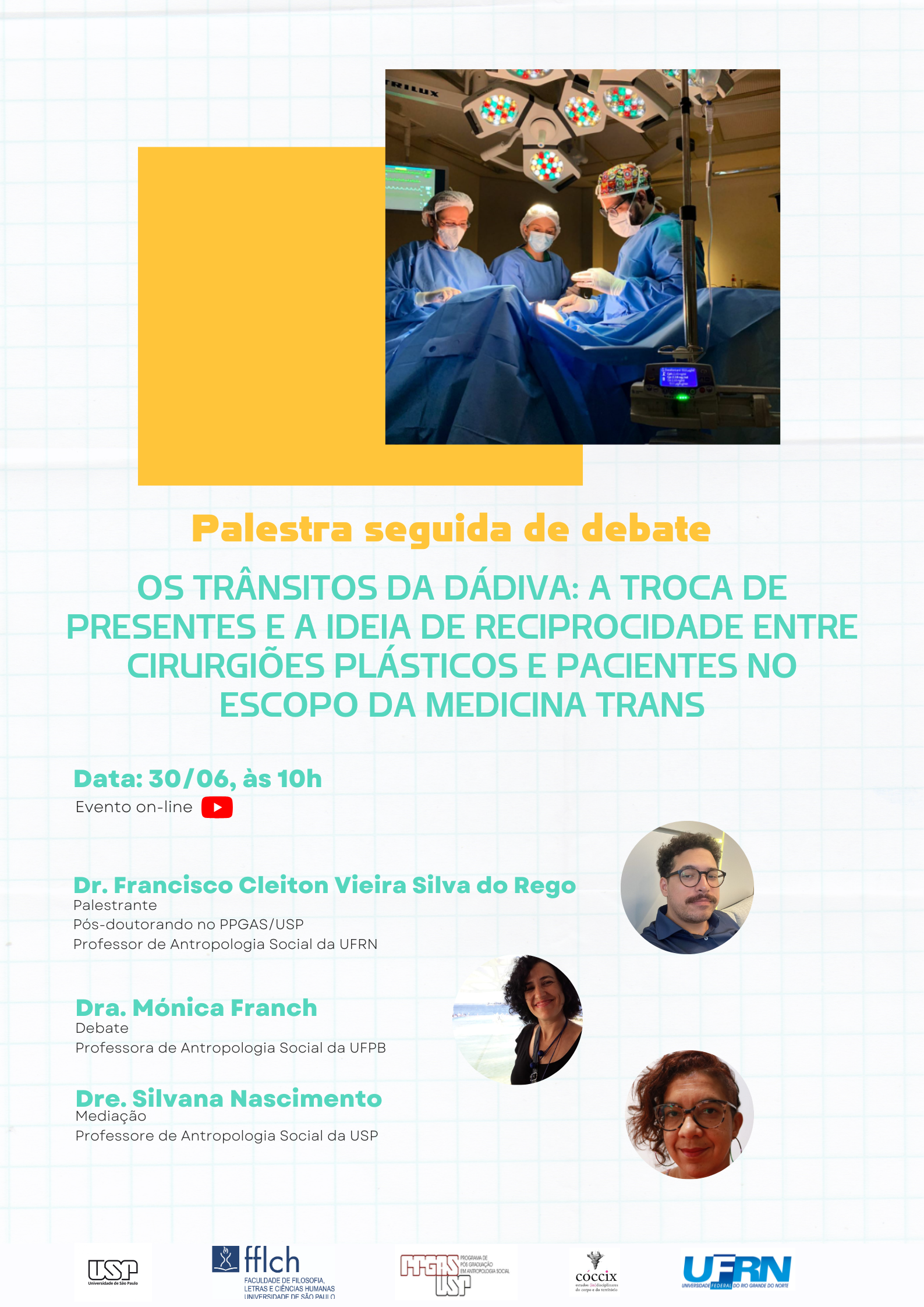The Cóccyx Research Group – (In)disciplinary Studies of the Body and Territory, from the Department of Anthropology, presents the lecture "The transits of the gift: the exchange of gifts and the idea of reciprocity between plastic surgeons and patients in the scope of trans medicine", by Prof. doctor Francisco Cleiton Vieira Silva do Rego (PPGAS-USP/UFRN), which aims to present part of the results of his research developed within the scope of the USP Post-Doctoral Program, in the Post-Graduate Program in Social Anthropology and in the Department of Anthropology of USP.
The event will be virtual and broadcast via the PPGAS/USP Channel on YouTube (Access link: https://youtube.com/ live/TyWNVT4vTB8) and will be mediated by Profe. Dre. Silvana de Souza Nascimento (USP) and with comments for Profa. Dr. Mónica Franch (UFPB).
Abstract: From an ethnography developed in plastic surgery clinics and hospitals in the region of São Paulo with the help of interviews, I am interested in this communication to observe how surgeries, in the context of biomedical assisted sex/gender change, imply themselves as gifts through which people make gifts to each other. Sexual and gender reassignment surgeries, which aim to offer material modifications to the signifiers of someone's sexed body, are currently performed in Brazil under different therapeutic visions that compete with each other. Although not yet hegemonic, some affirmative postures have not concentrated their actions on the search for the figure of the “true transsexual”, but on supporting people with different performances and erotic habitus in their gender transitions in different languages and state and market practices. In this sense, we are witnessing a depathologization and biomedicalization movement that transforms places in sexual and gender diversity in the medical scope. While a commercial transaction in strong growth in private clinics and hospitals, male and female surgeons are multiplying in the country offering operations that cover all known surgeries in the field of trans medicine, and indicate new places for transsexuals in the social world of Brazilian medicine: mammoplasty masculinization, augmentation mammoplasty, vaginoplasty, metoidioplasty, facial feminization, among others – which, in turn, are combined with medical-surgical operations performed on other audiences, such as facial harmonization, liposuction, lymphatic drainage, etc. However, from a commercial perspective, the payment and provision of the surgical service cannot be seen as a monetary relationship devoid of a social relationship that goes beyond it. When observing online advertising practices, male and female surgeons expose gifts they received from patients who operated on their social networks. On a visit to their offices, it is also possible to notice a good part of these gifts displayed as decorative objects on shelves and/or on tables that separate professionals and clients: photographs next to operated patients in wooden and metal frames, miniatures of doctors , trans flags, thank you cards, salt bottles to ward off the evil eye, chocolates. In continuity, patients share photographs and videos in their social networks through which they show gratitude and expose the surgery as a gift. Thus, material objects and emotions crystallized there are gifts that are exchanged between patients and surgeons; if the latter expose them updating their surgical practice in terms of notoriety and effectiveness, the former demonstrate the beauty and good technical result marked on their bodies. By offering an analysis of surgery as an object that enters a circuit of exchange relationship, it is possible to observe how people are trained in the surgical experience of the transition and how this does not imply a destitution of subject positions that are made possible by the sociopolitical conditions of which depart. The money-surgery monetary exchange can be understood as inaugurating a gift cycle that creates debts that are given and returned in a context of difficult access to surgical procedures for sex/gender change in the country and the very social and political configuration of the doctor-doctor relationship. patient. This leads, therefore, to a reflection on the symbolic and political operations of the idea of reciprocity in a commercial scenario, of body habitus, consumption and identity affirmation for the formation of the field of health and trans medicine in Brazil.


